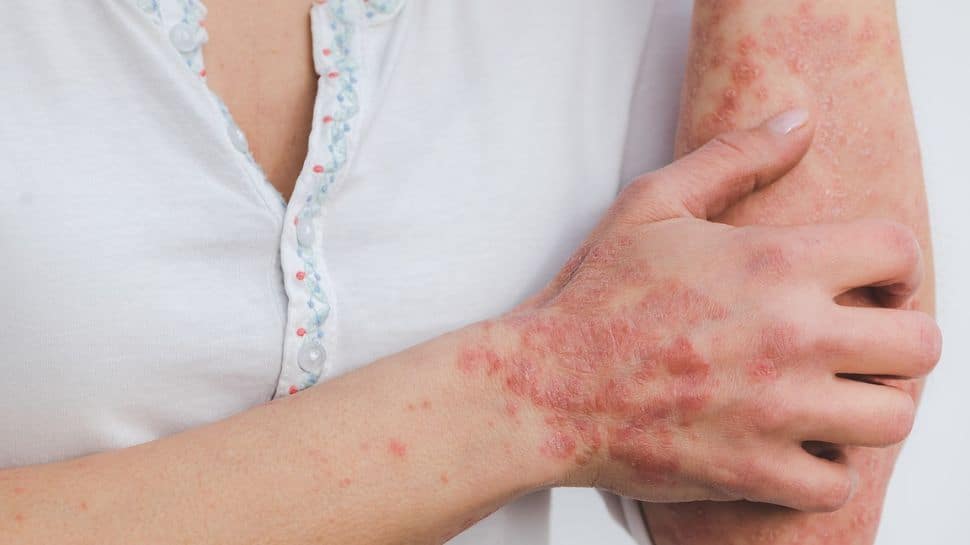By Dr Smriti Naswa Singh
On World Psoriasis Day, October 29, 2022, we take a look at what's Psoriasis, the different kinds of Psoriasis, its complications, its symptoms and its cure.
World Psoriasis Day 2022: What is psoriasis and different kinds of psoriasis
Psoriasis is a skin condition or disease in which a person gets rashes that tend to become itchy, causing scaly patches. It commonly occurs on the knees, elbows, trunk, and scalp. Since psoriasis is a common, long-term condition that is chronic, with no cure, it requires a diagnosis as it can make daily living difficult. Some common types of psoriasis include:
Plaque psoriasis or psoriasis Vulgaris: One of the most typical types of psoriasis, it results in raised red or pink plaques with thick scaling on the skin. It commonly affects the outer or extensor aspects of elbows, knees, lower back, and scalp. Further, this condition can become more aggravated during the winter season.
Scalp psoriasis: In this condition, scaly plaques on the scalp are visible in the patient. It can be confused with seborrheic dermatitis, an eczematous condition caused by the fungus causing dandruff.
Nail psoriasis: This type of psoriasis generally affects the fingers and toenails. It can cause pitting, discolouration, and separation of the nail plate from the nail bed.
Palmoplantar psoriasis: Since palmoplantar psoriasis involves the palms and soles of feet, it can cause thick, scaly skin with fissures, cuts, and bleeding. When a patient suffers from this condition, they have immense difficulty in walking and working with their hands.
Guttate psoriasis: A condition that usually occurs in young adults and children. It typically occurs after the person has suffered from an infection or a fever caused by a bacterial infection. This version of psoriasis heals fast and generally looks like a tiny drop of scaly lesions on the trunk and extremities.
Pustular psoriasis: In this condition, the patient has generalised pus-containing lesions all over their body. It can sometimes also be in a small area that is localised to the palms and soles of the body. Further, widespread use of steroids (oral and topical) followed by sudden withdrawal can precipitate pustular and erythrodermic psoriasis. To prevent this, using steroids must never be undertaken without consulting a dermatologist and finding the correct diagnosis for a condition.
Erythrodermic psoriasis: This type of psoriasis constitutes a medical emergency as more than 90 per cent of the body surface area is involved. In this condition, psoriasis loses its classical scaly plaque look and generalised red skin rash, resulting in peeling with itching or a severe burning sensation.
Inverse psoriasis: This disease involves body folds like groins, armpits and below the breasts. It causes red patches with fewer amounts of scaling, as these areas are prone to sweat.
Psoriatic arthritis: A condition that involves small joints of hands and feet. It is likely to affect the joints, it can cause pain and difficulty in everyday functioning.
World Psoriasis Day 2022: Complications of psoriasis
Psoriasis is a part of metabolic syndrome and hence psoriatic are at more risk of lifestyle diseases. Hence not only timely check-ups are important to promptly diagnose the diseases and prevent complications, but following a healthy lifestyle (with a high-fibre diet, exercise, proper sleep, and preventing mental stress) is also important to manage psoriasis better and prevent its complications.
Complications of psoriasis include:
Some of the complications that Psoriatic arthritis causes are pain, stiffness, and swelling in and around the joints, temporary skin colour changes (post-inflammatory hypopigmentation or hyperpigmentation) where plaques have healed. It also creates eye conditions, such as conjunctivitis, blepharitis, and uveitis. Other complications are as follows:
- Obesity
- Type 2 diabetes
- High blood pressure
- Cardiovascular disease
- Mental health conditions, such as low self-esteem and depression
- Other autoimmune diseases, such as celiac disease, sclerosis, and the inflammatory bowel disease called Crohn's disease
Also read: World Psoriasis Day 2022: Day, History, Significance, Theme and Symptoms
World Psoriasis Day 2022: Symptoms of psoriasis
Psoriasis is a medical condition that occurs when skin cells are replaced more quickly than usual. Although the exact reason for this is relatively unknown, research suggests that a problem with the immune system causes this condition. In a genetically predisposed individual, infections, trauma, scratching, cuts, burns, and medications like lithium and anti-blood pressure can aggravate psoriasis.
A red scaly patch is raised above the skin surface, which can become itchy and aggravate during winter. This condition usually involves the extensor portion of the body (which is a muscle serving to extend a bodily part such as a limb), like the elbow, knees, and scalp. Due to thick scaling, psoriasis leads to dry, cracked skin and fissures, which can cause a burning sensation, especially in the palms. Psoriasis lesions flare and wane cyclically during the winter season or periods of physical (illness/surgery) or mental stress.
World Psoriasis Day 2022: Treatment options
Depending upon the extent and severity of psoriasis, a dermatologist will choose topical creams or oral/IV therapy for the patient. Some popular topical creams include:
- Topical corticosteroids: These are only used in patients with thick plaques that are resistant. It is used to treat mild to moderate psoriasis.
- Vitamin D analogues
- Topical calcineurin inhibitors
- Coal tar
- Anthralin
- Light therapy (sunlight, psoralen with UVA, NBUVB)
- Retinoids
- Salicylic acid
On the other hand, oral or IV therapy includes methotrexate, cyclosporine, retinoids, biologics, and apremilast.
World Psoriasis Day 2022: Precautions and prevention
Psoriasis is a part of metabolic syndrome, and psoriatic are at more risk of lifestyle diseases. That is why timely check-ups are essential to diagnose diseases and prevent complications promptly. Additionally, by following a healthy lifestyle (that includes a high-fibre diet, exercise, proper sleep, and preventing mental stress), it is possible to manage psoriasis better and prevent its complications. Some other precautions that a patient who has psoriasis should include:
- Infections, including strep throat or skin infections, can flare up psoriasis in a person
- Weather, especially cold, dry conditions
- Any injury to the skin, like a cut or scrape, bug bite, or severe sunburn
- Smoking including exposure to second-hand smoke
- Alcohol consumption, especially when consumed daily
- Certain medications like lithium, high blood pressure drugs, and antimalarial drugs
- Rapid withdrawal of oral or injected corticosteroids
- Smoking aggravates the risk of psoriasis and increases its severity
(Disclaimer: Dr Smriti Naswa Singh is a Consultant Dermatologist & Cosmetic Dermatologist, Fortis Hospital, Mulund. The views expressed in this article are those of the author and Zee News does not confirm it.)
















